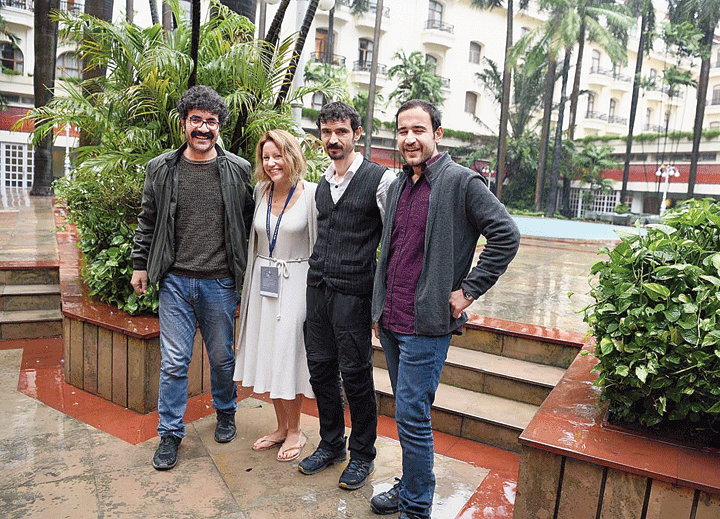A 142-minute war feature that had its world premiere at Kolkata International Film Festival on Monday stood out for its theme, which claimed even some of the makers of the film.
The End Will Be Spectacular (Ji Bo Azadiyê) was shot in the middle of an armed conflict in the Kurdish-majority area of Syria.
“Between the time shooting started and by the time post-production work was wrapped up, some members of the crew had been killed in bombings,” said Alba Sotorra, an independent filmmaker from Barcelona who has co-produced the film.
Sotorra is part of a four-member team that has come to Calcutta to present the film. Director Ersin Celik, producer Diyar Hesso and actor Shero Hinde have accompanied him to the city.
All three men are Kurds from Turkey and Syria.
Sotorra’s last film was Commander Arian, the story of a female soldier — a leader of the Kurdish Women’s Protection Unit — who fought the Islamic State in Syria.
Metro caught up with the team over the weekend.
Film in the time of war
The main part was shot in Kobanê, a Syrian town close to the Turkish border. “The battle against ISIS was raging when we were shooting for the film. During the shootings, the Turkish army began to bomb parts of Kurdistan in Syria. We were under constant threat of attack on the movie set,” said producer Diyar Hesso.
The film is inspired from the real-life story of an armed resistance in 2015 against the Turkish government’s crackdown on Sur, a district in the Kurd-dominated city of Diyarbakir in southeastern Turkey.
Turkish forces are accused of killing hundreds during operations against Kurdish rebels.
The film’s protagonist is Zilan, a young woman who, driven by the memory of her dead brother, returns to her hometown. She finds herself involved in the resistance against the state forces. Two people who took part in the Sur resistance played themselves in the film. “Sur, where the real story happens, is dotted with heritage buildings — some 500 years old, some older. But it was impossible to shoot in Sur,” he said.
The parts of Syria they had shot in, despite the uncertainties associated with war, were in the middle of a socio-cultural change. When the team goes back, they are not sure things would remain the same.
Change in balance
The Kurdish forces had carved out an enclave in northeastern Syria during the war. “One of the biggest achievements of the autonomous Kurdish administration was women empowerment. All executive bodies and decision-making institutions had significant women representation. In a way, the region was being ruled by women, who had empowered themselves in all areas, the military, political and civil,” said Sotorra.
All of this has come under threat following the withdrawal of US forces from northeastern Syria, she added. For starters, it has triggered Turkish army offensives and there have been multiple reports of IS jailbreaks from Kurdish-guarded prisons.
The withdrawal of US forces has triggered fears that the area would go back to the dark period when forced marriages and honour crimes were common. “Earlier, women were not allowed to live alone and divorced women were not allowed to keep children,” said Sotorra.
Story breaks siege
The Calcutta premiere was a major step in taking the story of Sur to the world, said Celik, who wrote the script. “What happened in Sur was meant to be wiped out. On one side, there is a state hell-bent on not letting the stories out. On the other side are the rebels desperate to ensure the story breaks the siege... for the world to take notice of,” said Celik.
Sotorra had met Ananya Chatterjee Chakraborti, the chairperson of the state commission for protection of child rights, at a film festival in Afghanistan earlier this year, where both were jury members. It was Chatterjee Chakraborti who suggested that Sotorra bring her film to Calcutta.
“We are aware of Calcutta’s passion about films. The festival seems a people’s programme, not limited to a select few dressed in fancy clothes. We are grateful for being able to screen the film here,” said Sotorra.











